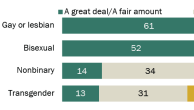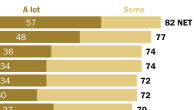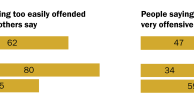Eight-in-ten U.S. Jews say caring about Israel is an essential or important part of what being Jewish means to them. Nearly six-in-ten say they personally feel an emotional attachment to Israel, and a similar share say they follow news about the Jewish state at least somewhat closely.
At the same time, the survey – conducted during the final 14 months of the Trump administration – shows a wide range of views among U.S. Jews about the Israeli government, including some pockets of strong criticism. Fewer than half of U.S. Jews give Israeli Prime Minister Benjamin Netanyahu “excellent” or “good” ratings for his leadership. And just one-in-three say they think the Israeli government is making a sincere effort toward achieving peace with the Palestinians. (Fewer still, just 12%, say they think Palestinian leaders are sincere in these efforts.)
The study also finds that a slim majority of U.S. Jews have heard about the boycott, divestment and sanctions (BDS) movement. The vast majority who have heard of the movement say they oppose it.
The remainder of this chapter explores these and related findings in more detail. For an analysis of how much U.S. Jews say they have in common with Jews in Israel, see Chapter 5.
Travel to Israel
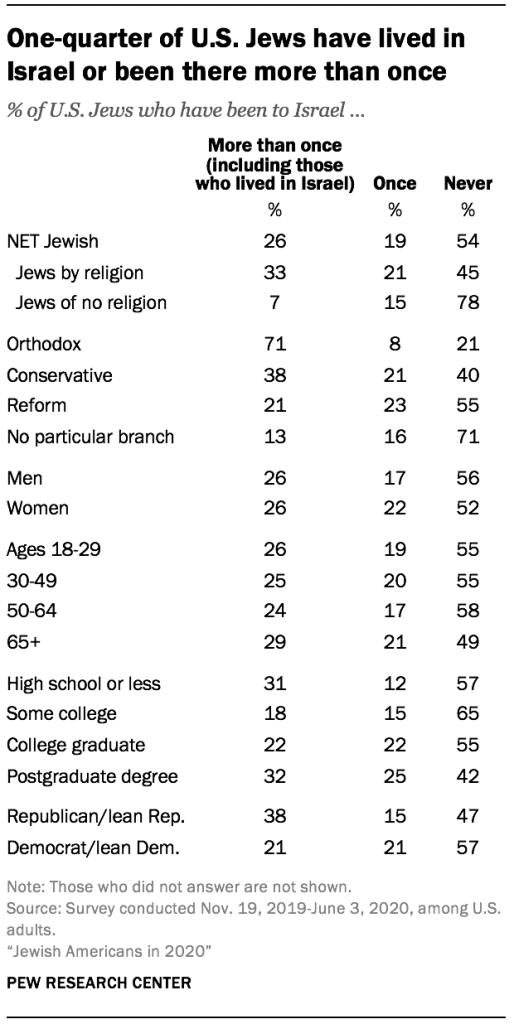
Just under half of U.S. Jewish adults (45%) have been to Israel, including 19% who have visited once and 26% who have visited multiple times or have lived in Israel.
Far more Jews by religion than Jews of no religion have visited or lived in Israel (54% vs. 22%). Roughly eight-in-ten Orthodox Jews surveyed have been to Israel, as have 59% of Conservative Jews, 44% of Reform Jews and 29% of Jews who do not affiliate with any particular branch or stream of American Judaism.
These results are similar to the 2013 study, which found that 43% of U.S. Jews had been to Israel, including 23% who had been more than once.
Attachment to Israel
Nearly six-in-ten U.S. Jews say they are either very emotionally attached (25%) or somewhat emotionally attached (32%) to the modern state of Israel. The share of adults who are at least somewhat attached to Israel is twice as high among Jews by religion (67%) as among Jews of no religion (33%).
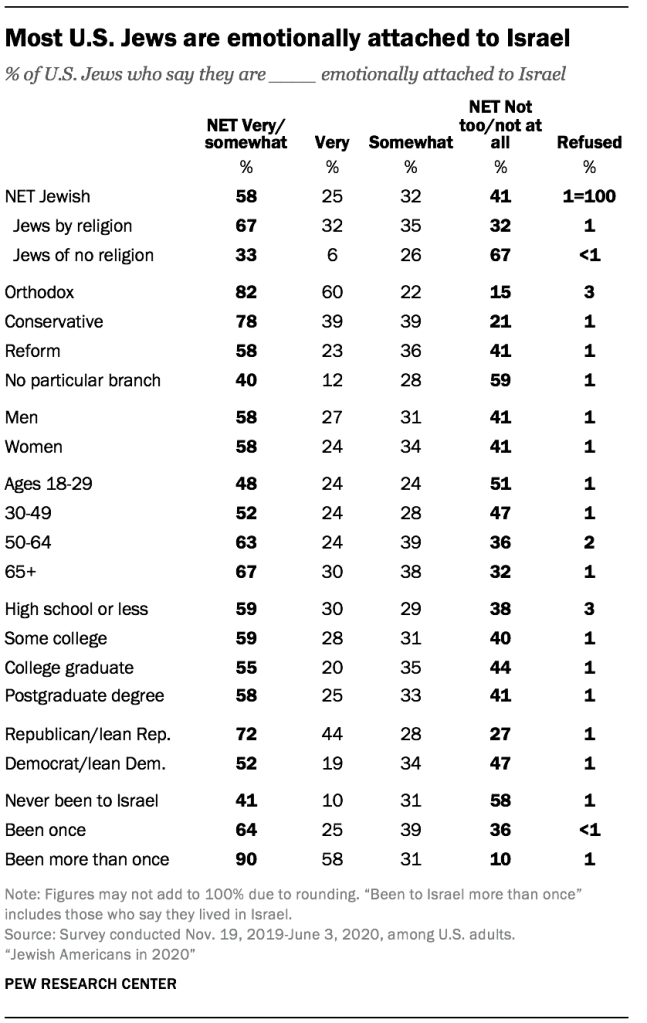
As was the case in the 2013 study, the new survey finds that Jews ages 50 and older are much more emotionally attached to Israel than are younger Jews.
Strong attachment to Israel is highest among Orthodox Jews. Indeed, Orthodox Jews are the only subgroup among whom a majority (60%) say they are very attached to the Jewish state. Six-in-ten Jews with no particular denominational affiliation (59%) say they are either “not too” or “not at all” emotionally attached to Israel.
Republicans and those who lean toward the Republican Party generally express greater levels of attachment to Israel than do Jewish Democrats and those who lean Democratic.
The survey finds a clear connection between having been to Israel and feelings of attachment to the nation. Fully nine-in-ten U.S. Jews who have lived in Israel or been there more than once say they feel at least somewhat attached to it. Two-thirds of those who have been there once say they feel an emotional attachment. And among American Jews who have never been to Israel, fewer than half say they feel attached to it. Of course, the survey cannot speak to the direction of this relationship: It could be that traveling to Israel leads to greater emotional attachment, but it could also be that Jews who feel a strong attachment to Israel are more likely to make the trip.
Broadly speaking, many of the patterns in the 2020 survey data on questions about Israel are similar to findings from the 2013 survey. However, the new survey was conducted online and by mail, while the 2013 survey was conducted by telephone, and a separate, methodological experiment indicates that Jewish respondents tend to report lower levels of attachment to Israel when they are responding in private (either online or by mail) than when they are speaking to a live interviewer (by phone). Consequently, the results of the two surveys on this question are not directly comparable, and this report is unable to say whether U.S. Jews’ levels of emotional attachment to Israel have changed appreciably since 2013. (For more information on the methodological experiment, see Appendix B.)
Overall, 45% of U.S. Jews say that caring about Israel is “essential” to what being Jewish means to them, and an additional 37% say that caring about Israel is an important (though not essential) part of their Jewish identity.
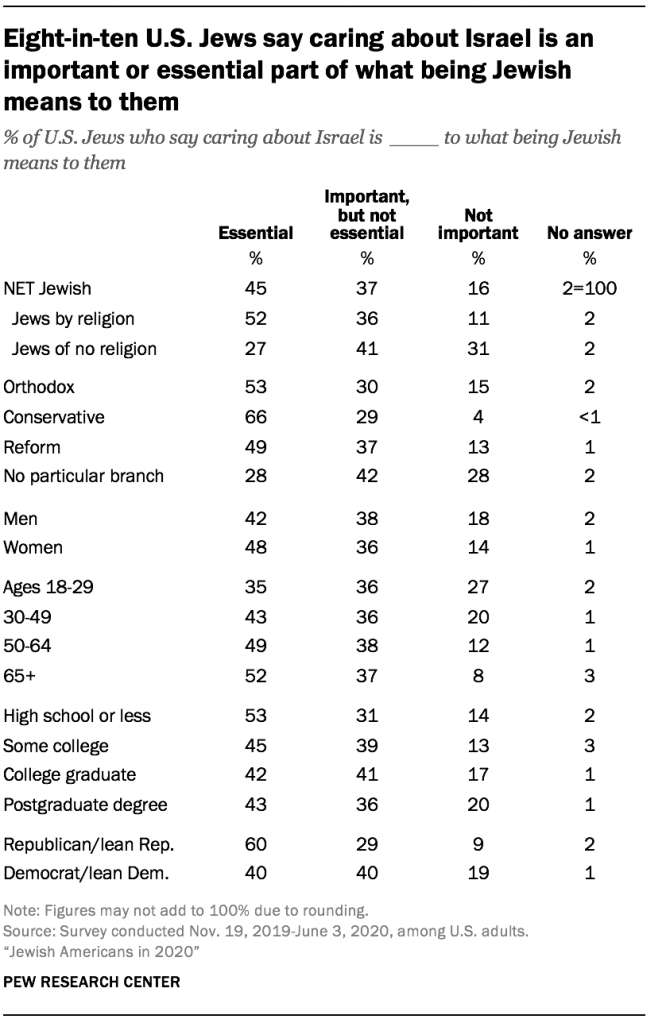
Caring about Israel is more central to the Jewish identity of Jews by religion than to Jews of no religion, among whom three-in-ten say that caring about Israel is not important to what being Jewish means to them. The survey also finds that caring about Israel is more central to the Jewish identity of older Jews (ages 50 and older) than to Jewish adults under the age of 30.
Two-thirds of Conservative Jews say that caring about Israel is essential to what being Jewish means to them, as do about half of Orthodox and Reform Jews (53% and 49% respectively). Among Jews with no attachment to any particular stream of Judaism, roughly one-quarter say caring about Israel is “essential” to their Jewish identity, 42% say this is “important, but not essential,” and 28% say it is not important.
This question was also asked in Pew Research Center’s 2013 study. However, the methodological experiment conducted to gauge the effect of transitioning from a telephone survey (such as the 2013 study) to a survey conducted online and by mail (like the new study) finds large mode effects on this item. Compared with those answering questions on the phone, respondents participating online and by mail are more likely to say that caring about Israel is “essential” to what being Jewish means to them, and less likely to say that this is “important, but not essential” to their Jewish identity. Thus, the results on this question in the new study are not directly comparable to those obtained in 2013. (For additional discussion of what else is “essential,” “important but not essential” and “not important” to respondents’ Jewish identity, see Chapter 2.)
Following news about Israel
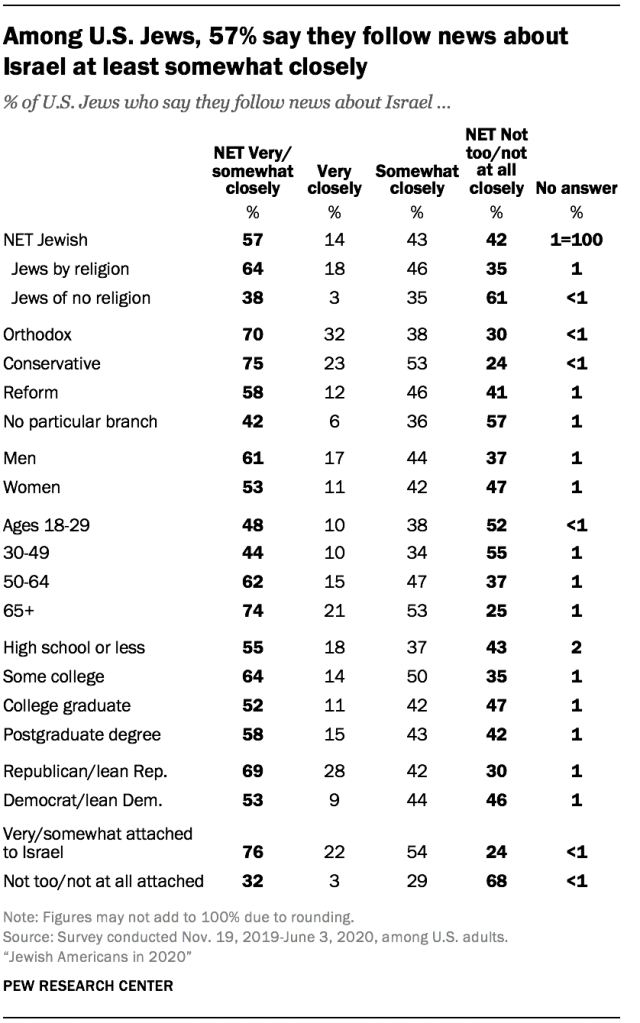
A slim majority of U.S. Jews say they follow news about Israel at least somewhat closely, including 14% who follow it “very closely” and 43% who follow it “somewhat closely.” On average, Jews by religion pay closer attention to news about Israel than do Jews of no religion, and older Jews are more tuned in to news about the Jewish state than are younger Jewish adults.
The survey also shows that Orthodox and Conservative Jews follow news about Israel more closely than do Reform Jews. And fewer than half of Jews with no denominational affiliation say they follow news about Israel.
Three-quarters of Jews who are emotionally attached to Israel say they follow news about the Jewish state at least somewhat closely. Jews who say they are “not too” or “not at all” attached to the Jewish state are much less likely to follow news about it.
This question was not asked in 2013.
Roughly half of U.S. Jews say U.S. level of support for Israel is about right
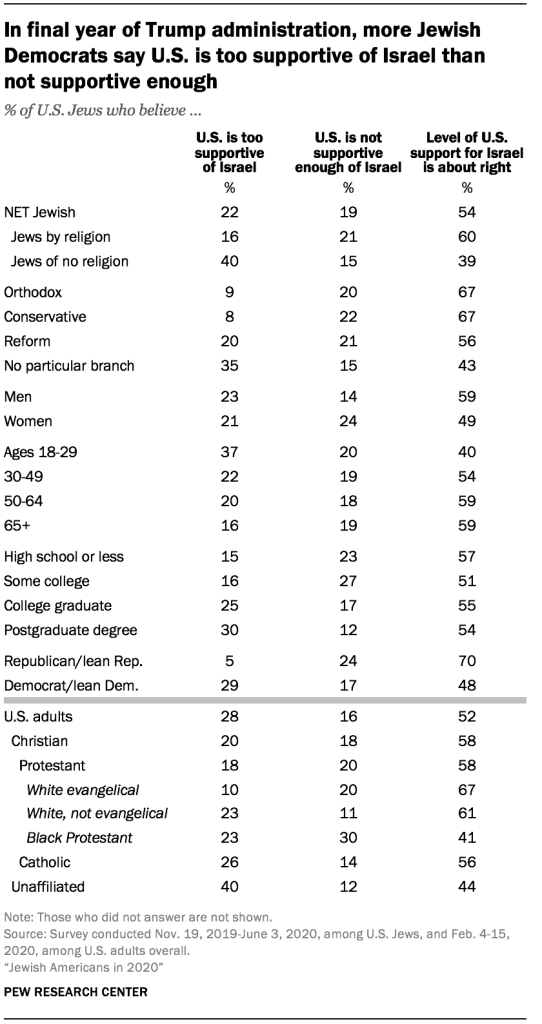
As of 2020, about one-in-five U.S. Jews (22%) say the U.S. is too supportive of Israel, up from 11% who said this in 2013. Over the same period, the share who say the U.S. is not sufficiently supportive of Israel declined by 12 percentage points (to 19%), while the share who say the level of U.S. support for Israel is “about right” has held steady (54% in each survey).
The survey, conducted during the last year of the Trump administration, finds that Jewish Democrats and those who lean toward the Democratic Party are much more likely than Jewish Republicans to say the U.S. is too supportive of Israel, while Jewish Republicans are more inclined than Democrats say U.S. support for Israel is about right.
As was the case in 2013, Jews of no religion are significantly more likely than Jews by religion to say the U.S. is too supportive of Israel. Also, in both surveys, Jewish adults under age 30 are far more inclined than Jews ages 50 and older to say the U.S. is too supportive of Israel.
A methodological experiment conducted in conjunction with the 2020 survey indicates that on this question, the results from 2020 can be compared with the results from 2013, because there appears to be little difference in the way respondents answer this question when speaking with a live interviewer (by phone) versus writing their answer in private (online or on a paper questionnaire). However, it is important to bear in mind when the two studies were fielded. Telephone interviews for the 2013 survey took place from Feb. 20 through June 13, 2013, during Barack Obama’s second term as president. The 2020 survey was conducted online and by mail from Nov. 19, 2019, through June 3, 2020, during Donald Trump’s presidency. See Appendix B for more details.
Netanyahu rated negatively by more than half of U.S. Jews
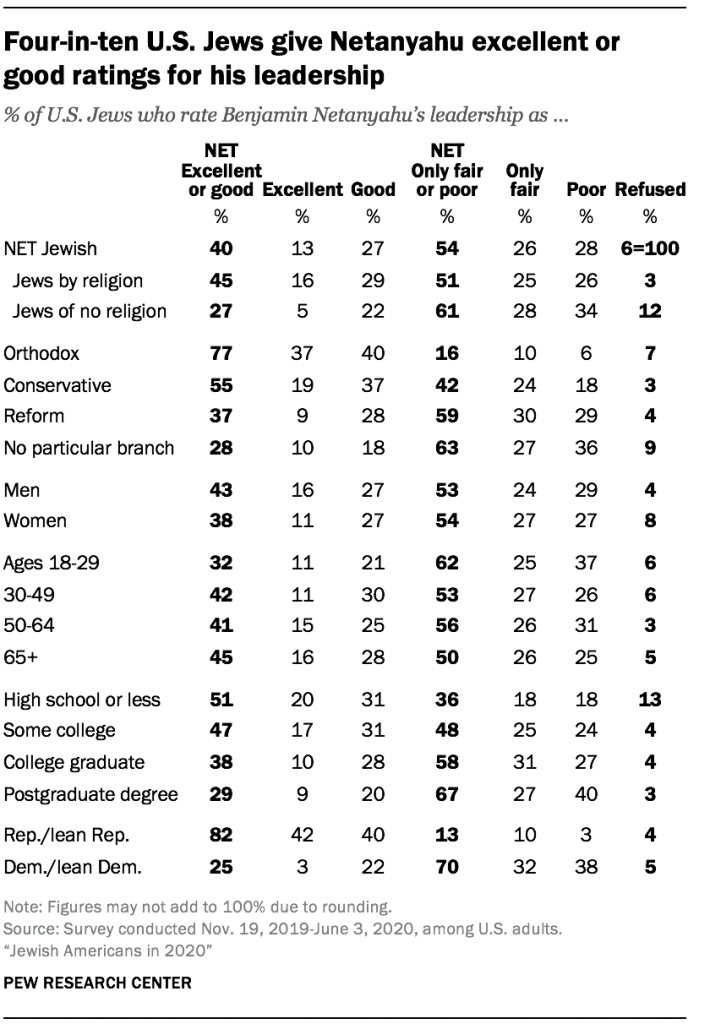
Four-in-ten U.S. Jews say Benjamin Netanyahu, the prime minister of Israel for more than a decade, has done an “excellent” (13%) or “good” job (27%) leading the country, while a slim majority say his leadership has been “only fair” (26%) or “poor” (28%).
Jews by religion rate Netanyahu more positively than do Jews of no religion, though even among Jews by religion, fewer than half (45%) say his leadership has been excellent or good.
About three-quarters of Orthodox Jews (77%) give Netanyahu’s leadership positive marks. Conservative Jews are more evenly divided in their views of Netanyahu’s leadership, though they also view him more positively than negatively. Most Reform Jews and those who do not affiliate with any branch or stream of U.S. Judaism, meanwhile, give Netanyahu only fair or poor ratings for his leadership. The survey also finds that higher levels of education are linked with more negative evaluations of Netanyahu.
U.S. Jews are deeply polarized along partisan lines on this question, which was not asked in 2013. Eight-in-ten Republicans and Republican leaners say Netanyahu’s leadership has been excellent or good. By contrast, seven-in-ten Jewish Democrats and Democratic leaners say Netanyahu’s leadership has been fair or poor.
Views of the Israeli-Palestinian conflict
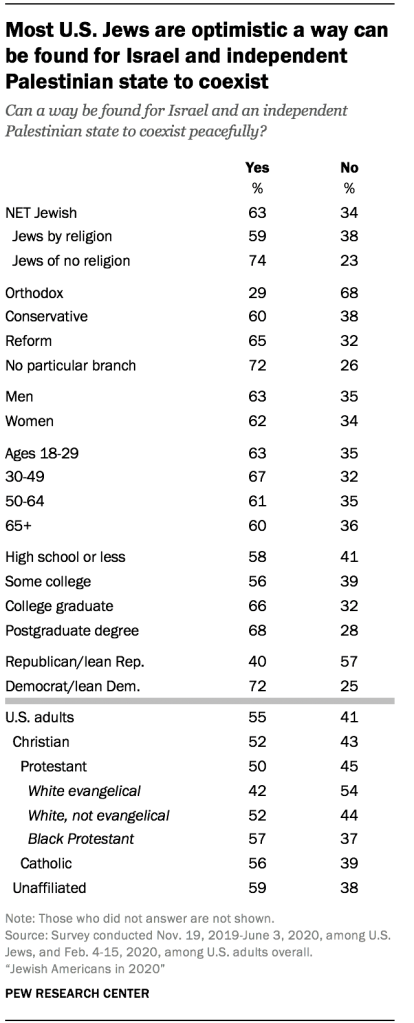
Most U.S. Jews (63%) say they think a way can be found for Israel and an independent Palestinian state to coexist peacefully.
Jews of no religion are somewhat more optimistic about the possibility of peaceful coexistence than are Jews by religion. Additionally, majorities of Conservative Jews, Reform Jews and those who don’t identify with any particular branch of American Judaism all think a way can be found for Israel and a Palestinian state to coexist in peace. Two-thirds of Orthodox Jews, by contrast, do not think this is possible.
Roughly seven-in-ten Jewish Democrats say they think Israel and an independent Palestinian state could coexist peacefully, while a slim majority of Jewish Republicans do not think this can happen.
As a whole, U.S. Jews are somewhat more likely than U.S. adults overall to believe a peaceful two-state solution to the conflict is possible (63% vs. 55%).
At the same time, just one-third of U.S. Jews say they think the Israeli government is making a sincere effort toward a peace settlement with the Palestinians. There is even more skepticism among U.S. Jews about the Palestinian effort on this front: Just 12% of U.S. Jews say they think the Palestinian leadership is making a sincere effort toward peace.
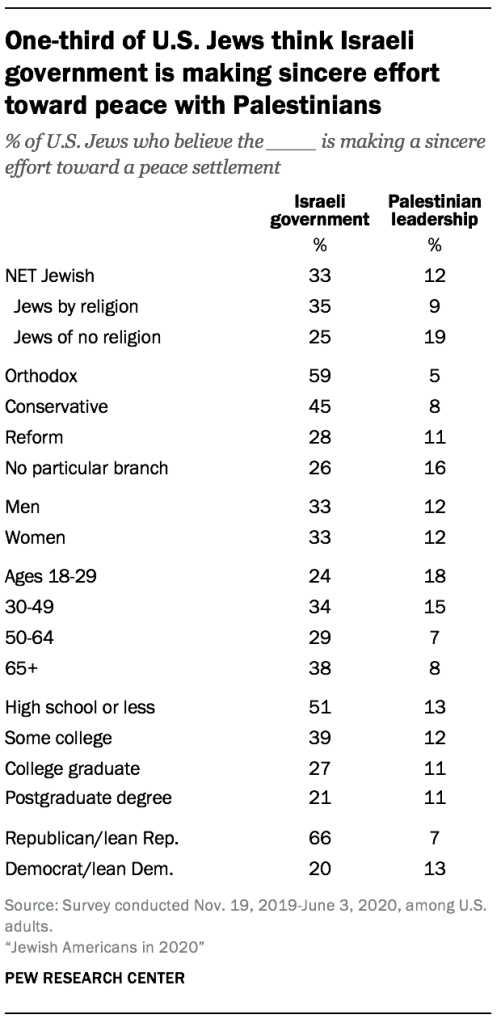
Jews by religion are about four times as likely to say the Israeli government is making a sincere effort toward peace as they are to say this about the Palestinian leadership (35% vs. 9%). Jews of no religion, by contrast, are almost as inclined to say the Palestinian leadership is sincerely seeking a peace settlement (19%) as they are to say the same about the Israeli government (25%).
U.S. Jews in most age groups are substantially more likely to say the Israeli government is sincere in its peace efforts than to say this about the Palestinians. But the youngest cohort of U.S. Jews is an exception to this pattern. Among Jewish adults under age 30, 24% say they think the Israeli government is making sincere efforts toward peace, while 18% say the same about Palestinian leadership.
Two-thirds of Jews who are Republicans or lean toward the Republican Party say they think the Israeli government is sincerely pursuing a peace settlement with the Palestinians, compared with one-in-five Jews who are Democrats or lean Democratic.
Comparing the results on the question about the Israeli government’s sincerity in the peace process with the same question in the 2013 survey is complicated by methodological differences between the two studies. An experiment (discussed in Appendix B) suggests that respondents are more likely to answer this question at all when answering online or by mail (as in 2020) rather than by telephone (as in 2013). As with many sensitive questions, more respondents say they don’t know or declined to answer when speaking to a live person on the phone than when writing an answer in private. In the experiment, the share of people answering the question was 5 percentage points higher online or by mail than by phone, and the higher response rate led to slightly increased support both for the notion that Israel’s government is sincere (+3 points) and for the notion that Israel’s government is not sincere (+2 points). This indicates that the 2020 and 2013 results are not directly comparable in a straightforward way. Since the share of Jewish respondents who called the Israeli government sincere was 38% in 2013 (vs. 33% in 2020), one might cautiously conclude either that there has been no significant change in overall opinion on this question or that the share who view Israel’s government as sincere may have ticked slightly downward from 2013 to 2020.
One-in-ten U.S. Jews support the BDS movement, while 43% oppose it and 43% haven’t heard much about it
A slim majority of U.S. Jews, including six-in-ten Jews by religion and 42% of Jews of no religion, say they have heard either “some” or “a lot” about the boycott, divestment and sanctions (BDS) movement.30
Nearly eight-in-ten Orthodox Jews and seven-in-ten Conservative Jews say they have heard at least something about the movement, as have 54% of Reform Jews. Among Jews who do not affiliate with any branch of American Judaism, fewer than half have heard of the movement.
Jews with the highest levels of education are more likely than others to have heard something about BDS.
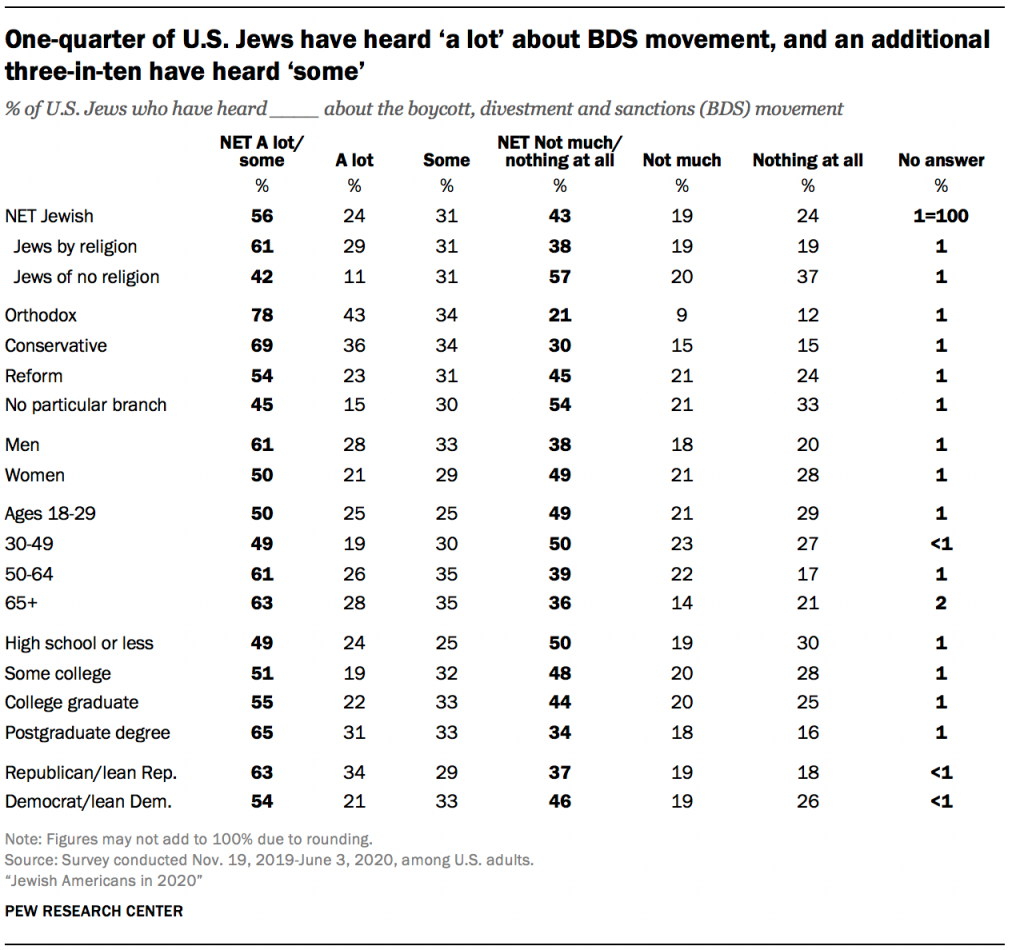
Respondents who said they had heard either “some” or “a lot” about BDS were asked a follow-up question to gauge their level of support or opposition. (Those who said they had heard “not much” or “nothing at all” about BDS were not asked any further questions about it.)
Overall, the survey finds far more opposition to than support for the BDS movement among U.S. Jews: 43% say they have heard at least something about BDS and they oppose it, while 10% say they have heard at least something about it and they support it. An additional 44% say they have not heard much or anything about it (or declined to say whether they have heard about it).
No subgroups of U.S. Jews express more support for BDS than opposition to it. But the ratio of opposition to support for the BDS movement is much more lopsided among Jewish Republicans (58% opposed vs. 3% supportive) than among Jewish Democrats (39% oppose vs. 13% support). It is also greater among Jews ages 65 and older (52% opposed vs. 7% supportive) than among Jews ages 18 to 29 (34% opposed vs. 13% supportive).
Orthodox Jews are particularly opposed to BDS. Fully 70% say they have heard about the movement and oppose it (including 65% who “strongly” oppose it), while 6% say they have heard about it and support it; the remainder have not heard about it or declined to answer.
Among Jews of no religion, 18% say they support BDS, 22% oppose it, and most say they have not heard about it.
Views of the BDS movement also are linked with assessments of Israel’s sincerity in the peace process and Netanyahu’s leadership. U.S. Jews who think the Israeli government is not sincerely pursuing a peace deal with the Palestinians, as well as U.S. Jews who think that Netanyahu’s leadership has been only fair or poor, are more likely to express support for the BDS movement than are those who take the opposite positions.
This question was not asked in 2013.
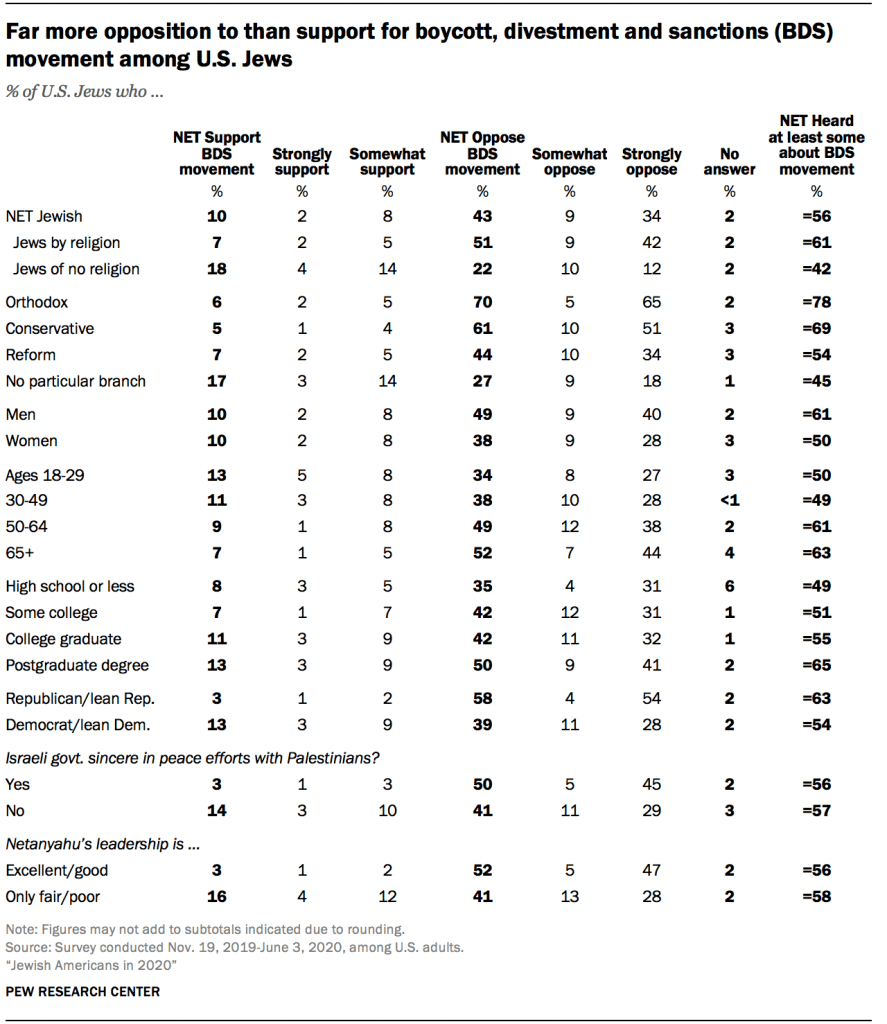
One-in-three Jews believe God gave the land that is now Israel to the Jewish people
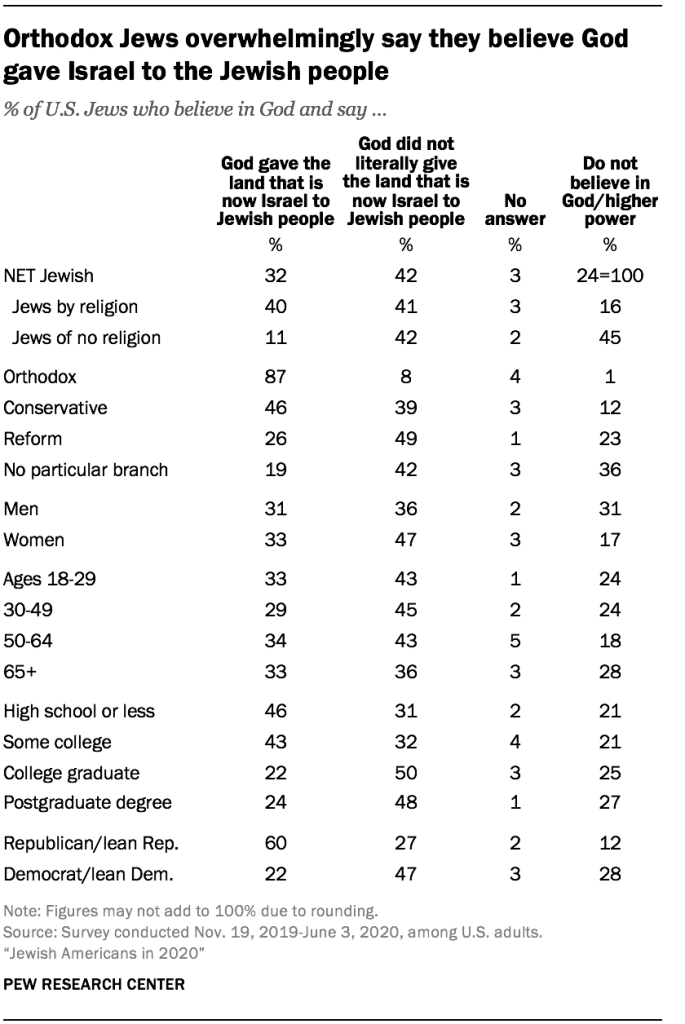
Roughly one-third of U.S. Jews say they believe God gave the land that is now Israel to the Jewish people, while 42% do not believe Israel was literally given by God to the Jews, and one-quarter of U.S. Jews say they do not believe in God or a higher power. Belief that God gave Israel to the Jewish people is much more common among Jews by religion than among Jews of no religion, but it is a minority opinion among both groups.
Nearly nine-in-ten Orthodox Jews (87%), however, believe God gave the land of Israel to the Jewish people.
Conservative Jews are divided on the question, while far fewer Reform Jews and those who do not belong to any particular branch of U.S. Judaism say they believe the land of Israel was given by God to the Jewish people.
Results on this question are not comparable to the 2013 survey in part because of a change in the wording of the question about belief in God, which results in a lower share of people who say they don’t believe there is a God or any higher power in the universe.
Sidebar: Discussing Israel from the pulpit can be a challenge for America’s rabbis
Speaking about Israel from synagogue pulpits is harder now than it used to be, because American congregations are less unified on the subject, according to in-depth interviews with two dozen rabbis conducted separately from Pew Research Center’s 2020 survey of Jewish Americans.31
To provide another window into some of the changes occurring in American Jewish life, Pew Research Center conducted a series of in-depth interviews with rabbis and other Jewish leaders. These conversations were separate from the survey of U.S. Jews. Although the interviewees were not selected in a scientific manner, and hence are not representative of Jewish leaders overall, we sought a diversity of viewpoints and have tried to convey them impartially, without taking sides or promoting any positions, policies or outcomes.
Many of the rabbis said their synagogues include more critics of the Israeli government than they did in the past. Asked how they approach the topic in sermons, several rabbis said they choose their words carefully and try not to unintentionally or unnecessarily alienate people in their congregations, which they know contain both staunch supporters and persistent critics of the Israeli government.
Rabbi Aaron Alexander of Adas Israel Congregation in Washington, D.C., said he doesn’t want his words on the topic to further divide congregants. His Conservative synagogue includes “people on the far left and the far right,” he said, adding that both are “very strong” groups.
“It doesn’t take much to fragment the community, or to find a wedge that can tear people apart,” he said. “We are very careful with how we introduce wedge topics, and Israel, for better or worse, has become that in the Jewish community. It’s something that, whatever people believe, they believe with a deep passion.”
In the town of Sharon, Massachusetts, Rabbi Ron Fish officiates at Temple Israel, a Conservative synagogue where “we add the prayer for the state of Israel to our tefilah every day,” he said, using a Hebrew word for the ritual recitation of prayers. “We have a lot of folks who have homes in Israel or children or grandchildren in Israel. It’s a big part of their identity.”
At the same time, he said, the synagogue community includes young adults – including grown children of longtime members – who are ardent critics of the current Israeli government. “Some of them see themselves as not having a place inside the [synagogue] community because they feel their views and their framing of the challenges are never given voice.”
He said it bothers him that these younger people don’t feel included. “I’m concerned about that,” he said. “I try to give it voice, but I’ve been pushed back on by some members of the community from time to time. … The people on, let’s call it the right, are very clear that from their point of view, supporting Israel means opposing the Iran deal, always mistrusting the Palestinian Authority, and identifying anti-Semitism in much of the Muslim world as a vital and current threat of the highest order to the Jewish community.”
The 2020 survey shows that Orthodox Jews are more likely than other U.S. Jews to feel very attached to Israel, to rate Israeli Prime Minister Benjamin Netanyahu’s leadership positively and to say they think the Israeli government’s peace efforts are sincere.
“Netanyahu enjoys extreme, very significant support, if not unilateral support, within the Orthodox community,” said Rabbi Yisrael Gelb, who served as executive director of Agudath Israel of California, an Orthodox organization, from 2018 through 2020. “We have tremendous support for Israel in terms of the government. We have lots of family who live there. Anything that happens in Israel, whether it be social or political, has a very significant effect on our population. Many of our community members have second homes in Israel that they go to a lot.”
Still, several of the Orthodox rabbis interviewed by Pew Research Center said their congregants include critics of the Israeli government as well.
“We’re very strong supporters of Israel, but obviously, being in Washington, we have people on the right and the left,” said Rabbi Shmuel Herzfeld of Ohev Sholom–The National Synagogue, a Modern Orthodox congregation in Washington, D.C. “So we try to do it in a way that brings as many people as possible together.” For example, he said, the congregation donates to a food bank in Israel, which congregants across the political spectrum agree is a good cause.
Several rabbis said they see part of their role as introducing congregants to multiple points of view.
Rabbi Enid Lader of Beth Israel – The West Temple in Cleveland, Ohio, a Reform congregation, called herself a supporter of Israel who nevertheless has “big questions about what’s going on there and human rights.” She said that in the past, “if we’ve had people from a liberal perspective speak, there’ve been people from a more conservative perspective who see that as an affront to ‘what’s really happening,’ unquote. I see my role as helping people be able to appreciate different perspectives. They might not agree with them, but to at least allow them to hear a point of view.”
Even the critics of Israel in their congregations generally support Israel’s right to exist as a Jewish state, the rabbis said.
“Historically we’ve been a Zionist congregation, and we continue to be so,” said Rabbi Brigitte Rosenberg of United Hebrew Congregation in Chesterfield, Missouri, a suburb of St. Louis. “It doesn’t mean we don’t call Israel out. It doesn’t mean we don’t have difficult conversations about Israel. But we’ve always, as a congregation, supported Israel’s right to exist – and specifically Israel’s right to exist as a Jewish state.”
